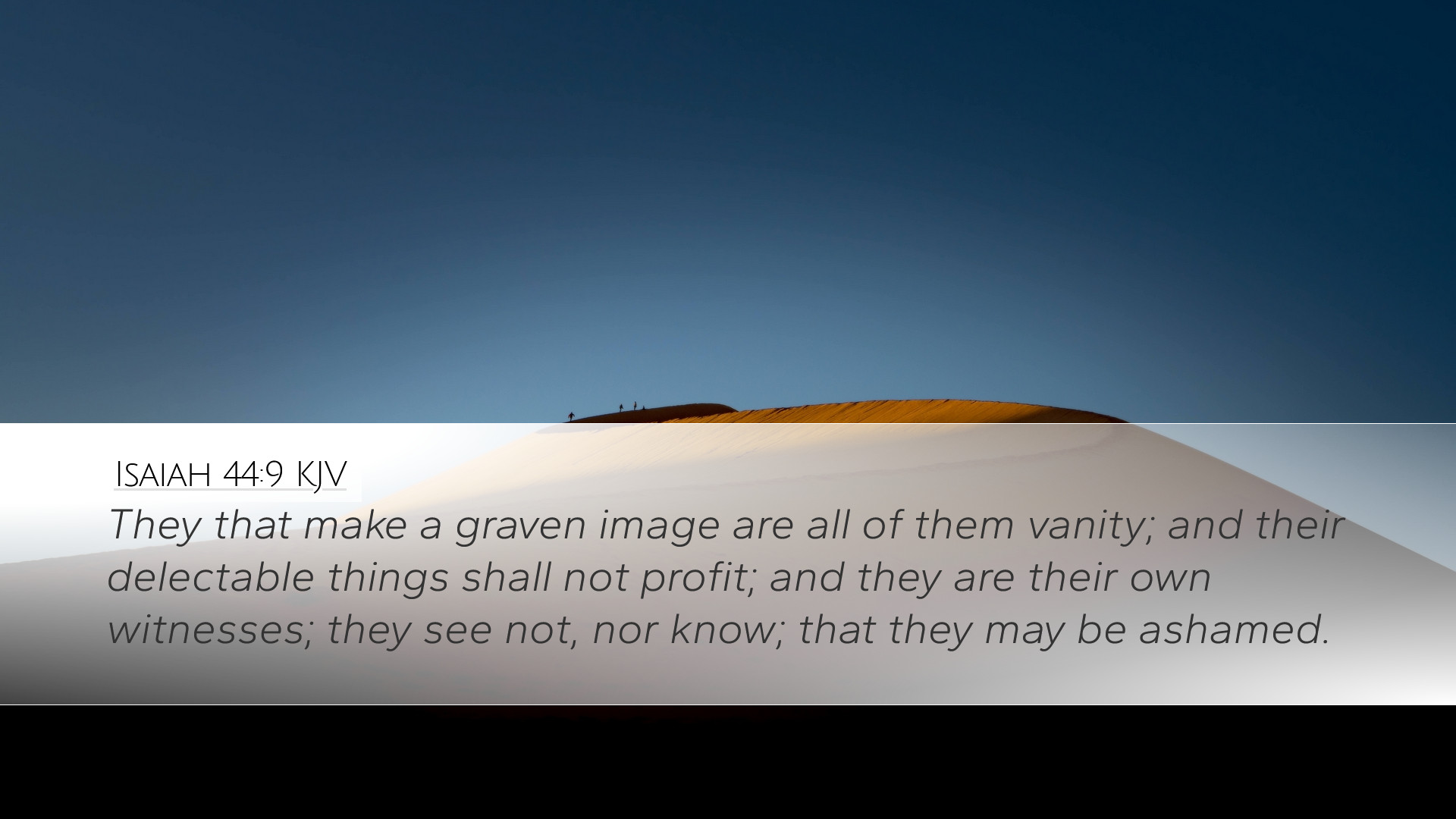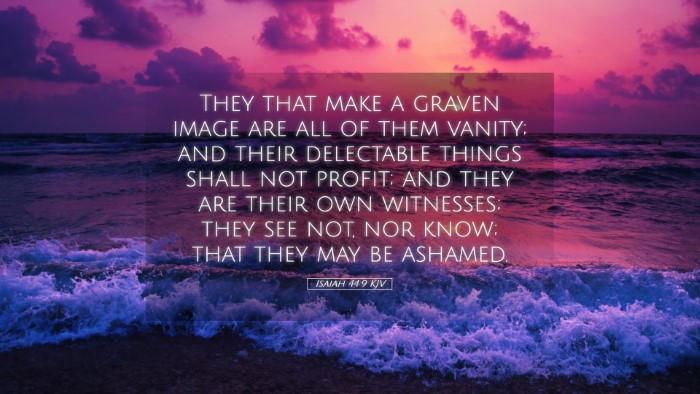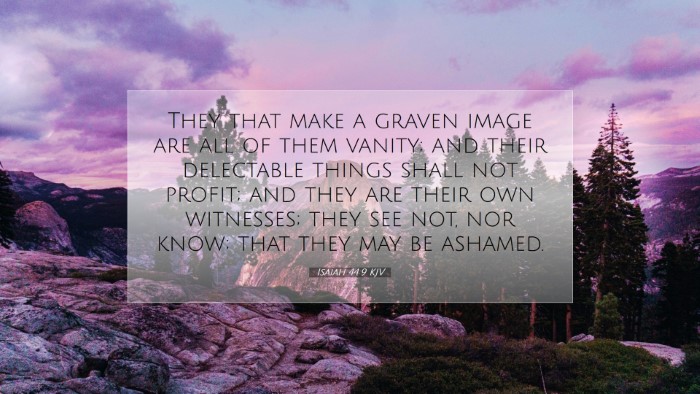Commentary on Isaiah 44:9
Isaiah 44:9 states:
"They that make a graven image are all of them vanity; and their delectable things shall not profit; and they are their own witnesses; they see not, nor know; that they may be ashamed."
This verse falls within a section of Isaiah where the prophet addresses the folly of idolatry. Public domain commentaries have long recognized the rich theological and practical insights contained in this passage. Below, we compile insights from Matthew Henry, Albert Barnes, and Adam Clarke, providing a meaningful discussion for pastors, theologians, and Bible scholars.
Contextual Overview
The broader context of Isaiah 44 reveals God's sovereignty and power over creation, contrasting with the impotence of idols. In this chapter, the Lord speaks through the prophet to deliver a powerful message against the making and worship of graven images. The people of Israel were tempted to trust in created things rather than the Creator, and Isaiah's words serve to correct this misguided devotion.
Insight from Matthew Henry
Matthew Henry offers a detailed exposition on this verse, emphasizing the futility of idolatry:
- Nature of Idols: Henry describes idols as "vanity," highlighting their inherent nothingness. Idols, being man-made objects, cannot possess any power or divinity.
- Profitlessness: He underscores that these "delectable things" provide no real benefit. The appeal of idols lies only in their external beauty and the temporary satisfaction they may bring, which ultimately do not translate to spiritual nourishment or aid.
- Self-Witness of Idols: Henry points out the irony that idol-makers bear witness against themselves. In their creation, they must recognize that they have fashioned something that can neither see nor hear, leading to their own shame as they place their hopes in such things.
Insight from Albert Barnes
Albert Barnes provides a complementary analysis that reinforces Henry's observations:
- Condemnation of Idolatry: Barnes emphasizes that the passage exposes the absurdity of worshiping something that is fabricated by human hands. He notes that the very existence of idols is a testament to human folly and the misdirection of faith.
- Spiritual Blindness: He elaborates on the phrase "they see not, nor know," arguing that this reflects the spiritual blindness of those who venerate idols. They are unable to perceive the truth about God’s sovereignty over all creation.
- Call to Repentance: Barnes views this verse as a call for the people to turn away from their idolatrous practices and seek true worship of Yahweh, who alone is worthy of honor.
Insight from Adam Clarke
Adam Clarke contributes a theological perspective that expands on the implications of this passage:
- Philosophical Reflection: Clarke highlights the philosophical ramifications of idolatry. He posits that the act of creating images and idols signifies a departure from understanding the true nature of God, who is spirit and cannot be confined to material forms.
- Shame of Idol Worshippers: He underscores the shame that ultimately falls upon those who fashion idols, as Clarke emphasizes the contrast between the living God and lifeless graven images. Their inability to deliver or protect leads to inevitable shame.
- Historical Context: Clarke also provides historical context, noting that during Isaiah’s time, the people were heavily influenced by surrounding nations, and this led to syncretistic practices that diverged from pure worship of Yahweh.
Theological Implications
This verse invites readers to reflect deeply on the nature of true worship versus idolatry. The theological implications can be summarized as follows:
- God's Sovereignty: Isaiah clearly asserts the sovereignty of God in contrast with the impotence of idols. The attributes of God—awe-inspiring, powerful, and sovereign—cannot be captured or represented in any physical form.
- Human Responsibility: The act of creating idols indicates a failure to recognize one’s responsibility to worship the true God. It reflects a choice made out of spiritual shortsightedness.
- Call to Authenticity: Isaiah 44:9 serves as a call for believers to assess the authenticity of their worship practices and to ensure they align with the principles laid out in Scripture.
Practical Applications
For pastors, students, theologians, and scholars, this passage calls for practical reflection and application:
- Examine Personal Idols: Individuals are encouraged to identify modern idols—those things that may compete for their devotion and affection, whether material possessions, ambitions, or even relationships.
- Encourage True Worship: Church leaders should guide congregations towards authentic worship, reminding them of God’s greatness and encouraging a community that celebrates truth over falsehood.
- Teach the Sovereignty of God: This passage presents an opportunity to teach about God’s sovereignty in all aspects of life—the believer's assurance when confronted with worldly pressures to conform.
Conclusion
In summary, Isaiah 44:9 provides a profound warning against the vanity of idol-making and idolatrous worship. The combined insights from Matthew Henry, Albert Barnes, and Adam Clarke reveal the importance of recognizing the true nature of God versus the emptiness of false worship. It challenges all believers to examine their hearts seriously and to engage in worship that is rooted in truth, power, and divine recognition.


